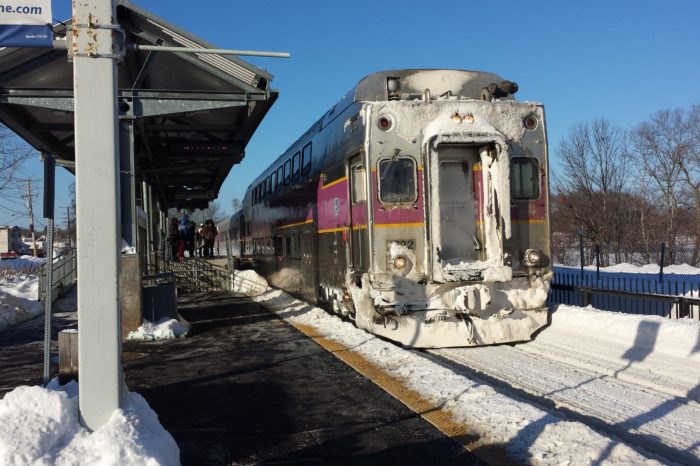Time to Fine Keolis
My train was on time this morning, no T-alerts popped into my email and, at long last, I enjoyed an express trip to Boston. For that, I am delighted. Still, we can’t let the last couple of woeful months on the commuter rail melt away like the snow.
MBTA commuter rail trains were late 72 percent of the time during morning rush hours in February, even though a much limited train schedule was implemented during the second half of the month. Delayed and cancelled trains exacted heavy tolls on commuters, employers and families.
With near-record snow fall and freezing temperatures, Mother Nature wreaked havoc on the system. Keolis, which operates commuter rail for the T, blamed bad weather for failing signals, switches and mechanical components of trains. They further blamed delays on heavy ridership – the obvious result of a limited train schedule – and the domino effect of other late trains.
At first the public bought it all, but weeks after the last significant snowfall, with functioning trains in short supply and routinely late, questions emerged.
The MBTA reminded us of the billions of dollars in deferred maintenance that surely impacted performance, but Keolis knew the state of the system before bidding on the contract.
Former state Transportation Secretary Kevin Sullivan has noted that the standard procedure during winter storms was to clear tracks and minimize disruptions by operating trains continuously. If snowfall is expected to be greater than four inches, the Keolis contract requires the company to remove snow around the clock once it builds to two inches.
Apparently, that didn’t happen.
For those caught waiting on platforms in frigid weather, the delays were only part of the ordeal. For weeks, commuters didn’t know when trains would arrive. Communication failed, email service alerts contradicted LED boards at stations and estimated delays were well off the mark. Commuters were left unable to make basic commitments, like when they’d be home for dinner.
Whether passengers are aboard trains or at stations, Keolis is required to inform them of delays every five minutes. Compliance was sporadic at best.
The Keolis operating agreement gives the MBTA maximum power in levying fines. Keolis can ask them to waive penalties, but the T ultimately decides.
Compliance with the contract’s snow removal provisions should be fully vetted. From this commuter’s perspective, the company fell short in its initial removal efforts and those missteps snowballed into chaos.
Pending the review, the MBTA should levy maximum fines to prevent similar situations next winter. Even so, Keolis has a safety net – the company can only be fined up to its assumed profit in any given month.
The fines will hurt, but commuters lost much more.
Mary Z. Connaughton is the Director of Government Transparency at Pioneer Institute.



